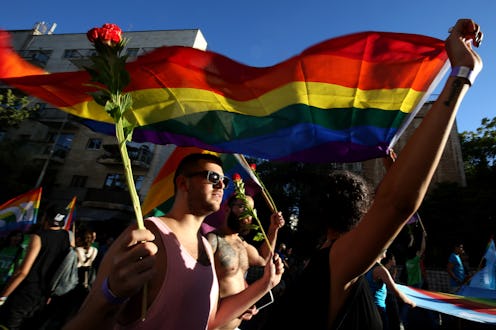
In light of the massive turnout for the Women's March on Washington, activists for LGBTQ rights are currently rallying to march on D.C. in June of this year. If you've heard of the National Pride March coming to Washington, then you're already familiar with this new event set to draw crowds from across the country, and while things are still in development, many queer people — including yours truly — are already pumped to get started.
The creator behind the march is David Bruinooge, 42, who is openly gay and lives in Brooklyn, NY. He announced the National Pride March via Facebook event following the Women's March, selecting the dates of June 8 - 11, 2017 so the march will coincide with the Pride month celebrations in D.C. The event describes itself as "all inclusive and peaceful event." If all goes according to plan, this march will be the first LGBTQ march in D.C. since 2009, according to Queerty, when hundreds of thousands of people gathered to show support for legalizing same-sex marriage in all 50 states. (According to its Facebook page, the National Pride March is not currently returning media requests for comment until more details are confirmed.)
Why do LGBTQ people need to march on Washington right now? Well, similarly to how women feel attacked and threatened by many aspects of the new administration under President Trump, the queer community has a lot to worry about.
Trump has gone back and forth on LGBTQ rights issues over the years, but Vice President Mike Pence has a solid record of pushing anti-LGBTQ policies. With a Republican majority in both the House and the Senate and a Republican president in the White House, many queer people are worried that more anti-LGBTQ policies will pass than in recent years.
While it's tempting to simply hope that there will not be a rollback on LGBTQ rights, there are no guarantees. It is possible for marriage equality to be repealed, or brought back down to the state level. Even aside from marriage, many queer couples are worried about the administration changing laws for second-parent adoption, immigration status, insurance benefits, and ownership, such as who inherits a home after their partner dies.
For LGBTQ people who have intersectional identities, the current political climate can be even more concerning. For example, for people who are transgender, people of color, or sex workers, there may be additional obstacles and concerns that an able-bodied, cisgender, gay man doesn't have to worry about — think, for example of the many "bathroom bills" that have been introduced recently denying trans individuals the right to use the bathroom that corresponds with their gender. These bills are concerning enough at the state level, let alone what might happen should they arise at the federal level. For this reason, it's especially important that marches for LGBTQ rights be inclusive and representative for all identities, not just some of the queer community.
It's also important to point out that the Women's March on Washington and its sister marches across the country were validly criticized for lacking inclusivity for queer people. For example, vagina- and uterus-based imagery was prevalent among the signs carried by many marchers; however, the proliferation of this imagery was alienating for many queer marchers. Many queer people who have vaginas do not identify as women; similarly, many trans women identify as women, but don't necessarily have female reproductive organs. While some march environments were obviously more inclusive than others, the focus of womanhood equaling certain sexual organs felt isolating and exclusive for some marchers.
For these and many more reasons, many queer people are eager for a march environment that will — hopefully — be more openly inclusive of diverse gender identities and other intersections of the queer identity.